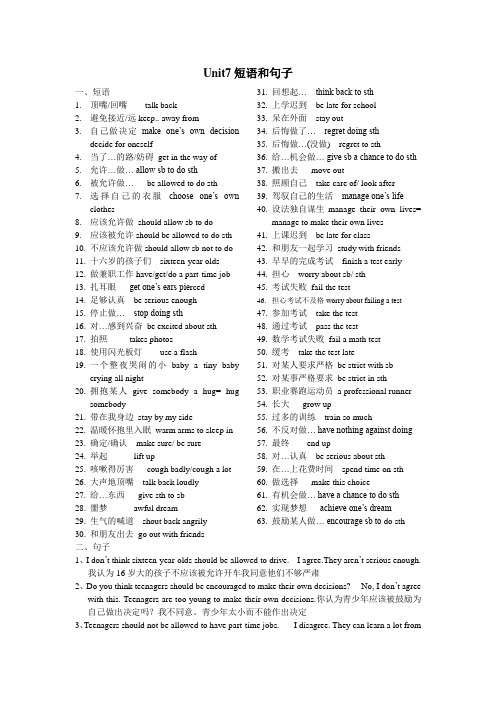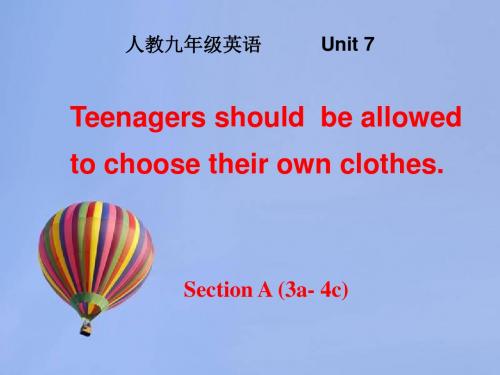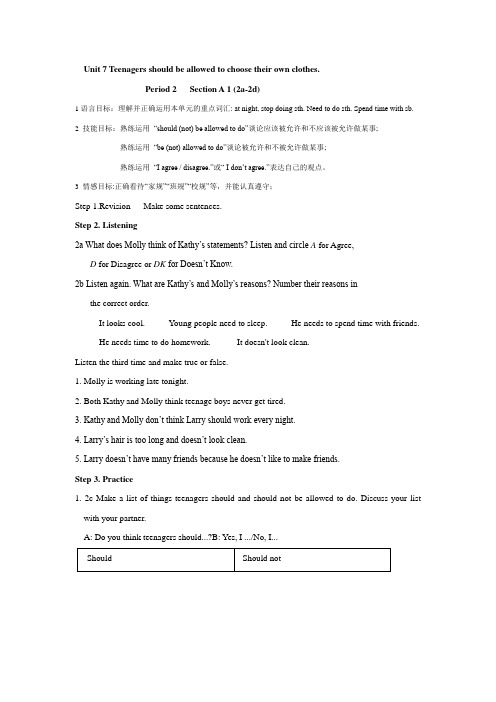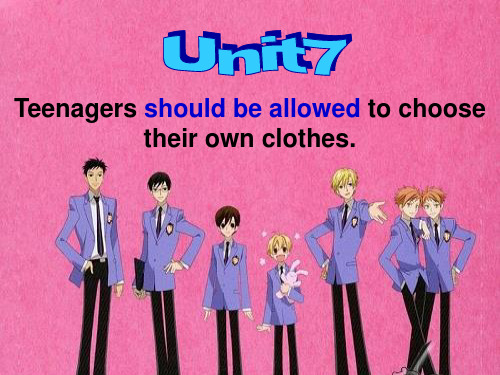新人教版Unit7-Teenagers-should-be-allowed-to-choose-their-own-clothes知识点及课后测试
- 格式:doc
- 大小:186.50 KB
- 文档页数:5

Unit7短语和句子一、短语1.顶嘴/回嘴talk back2.避免接近/远keep.. away from3.自己做决定make one’s own decisiondecide for oneself4.当了…的路/妨碍get in the way of5.允许…做… allow sb to do sth6.被允许做… be allowed to do sth7.选择自己的衣服choose one’s ownclothes8.应该允许做should allow sb to do9.应该被允许should be allowed to do sth10.不应该允许做should allow sb not to do11.十六岁的孩子们sixteen-year olds12.做兼职工作have/get/do a part-time job13.扎耳眼get one’s ears pie rced14.足够认真be serious enough15.停止做… stop doing sth16.对…感到兴奋be excited about sth17.拍照takes photos18.使用闪光板灯use a flash19.一个整夜哭闹的小baby a tiny babycrying all night20.拥抱某人give somebody a hug= hugsomebody21.带在我身边stay by my side22.温暖怀抱里入眠warm arms to sleep in23.确定/确认make sure/ be sure24.举起lift up25.咳嗽得厉害cough badly/cough a lot26.大声地顶嘴talk back loudly27.给…东西give sth to sb28.噩梦awful dream29.生气的喊道shout back angrily30.和朋友出去go out with friends 31.回想起… think back to sth32.上学迟到be late for school33.呆在外面stay out34.后悔做了… regret doing sth35.后悔做…(没做) regret to sth36.给…机会做… give sb a chance to do sth37.搬出去move out38.照顾自己take care of/ look after39.驾驭自己的生活manage one’s life40.设法独自谋生manage their own lives=manage to make their own lives41.上课迟到be late for class42.和朋友一起学习study with friends43.早早的完成考试finish a test early44.担心worry about sb/ sth45.考试失败fail the test46.担心考试不及格worry about failing a test47.参加考试take the test48.通过考试pass the test49.数学考试失败fail a math test50.缓考take the test late51.对某人要求严格be strict with sb52.对某事严格要求be strict in sth53.职业赛跑运动员a professional runner54.长大grow up55.过多的训练train so much56.不反对做… have nothing against doing57.最终end up58.对…认真be serious about sth59.在…上花费时间spend time on sth60.做选择make this choice61.有机会做… have a chance to do sth62.实现梦想achieve one’s dream63.鼓励某人做… encourage sb to do sth二、句子1、I don’t think sixteen-year-olds should be allowed to drive. --I agree.They aren’t serious enough.我认为16岁大的孩子不应该被允许开车我同意他们不够严肃2、Do you think teenagers should be encouraged to make their own decisions?--- No, I don’t agreewith this. Teenagers are too young to make their own decisions.你认为青少年应该被鼓励为自己做出决定吗?我不同意。


Unit 7 Teenagers should be allowed to choose their own clothes.Period 2 Section A 1 (2a-2d)1语言目标:理解并正确运用本单元的重点词汇: at night, stop doing sth. Need to do sth. Spend time with sb.2 技能目标:熟练运用“should (not) be allowed to do”谈论应该被允许和不应该被允许做某事;熟练运用“be (not) allowed to do”谈论被允许和不被允许做某事;熟练运用“I agree / disagree.”或“ I don’t agree.”表达自己的观点。
3 情感目标:正确看待“家规”“班规”“校规”等,并能认真遵守;Step 1.Revision Make some sentences.Step 2. Listening2a What does Molly think of Kathy’s statements? Listen and circle A for Agree,D for Disagree or DK for Doesn’t Know.2b Listen again. What are Kathy’s and Molly’s reasons? Number their reasons in the correct order._____ It looks cool._____ Young people need to sleep._____ He needs to spend time with friends. _____ He needs time to do homework. _____ It doesn't look clean.Listen the third time and make true or false.1. Molly is working late tonight.2. Both Kathy and Molly think teenage boys never get tired.3. Kathy and Molly don’t think Larry should work every night.4. Larry’s hair is too long and doesn’t look clean.5. Larry doesn’t have many friends because he doesn’t like to make friends.Step 3. Practice1. 2c Make a list of things teenagers should and should not be allowed to do. Discuss your list with your partner.A: Do you think teenagers should...?B: Yes, I .../No, I...2. 2d Read the conversation and answer the questions.1) Where do they go for school trip?2) Does Mr. Smith allow students to take photos?3) How to take photos?3. Fill in the blanks and role-play the conversation.Sandy: I’m really excited about seeing the famous paintings by Picasso.Wu Lan: Me, too! I’m gl ad Mr. Smith chose the art museum for our school trip this year. Sandy: I’m going to bring my new camera to take lots of photos!Wu Lan: Oh, no. Mr. Smith says we must not take photos. _____________________ ______________________. (博物馆不允许)Sandy: Th at’s too bad! Do you think __________________________________(会不会允许我们照相啊)if we don’t use a flash?Wu Lan: Hmm ... I think they just want to protect the paintings. So if you don’tuse a flash, then it might be OK.Sandy: Yeah. I think we sh ould be allowed to do that. I’ll bring my camera anyway.Step 4. Summarynguage pointsallow的用法2.1) Teenagers should be allowed to choose their own clothes.2) Teenagers should not be allowed to smoke.3) It is not allowed in the museum.4) Do you think we may be allowed to take photos if we don't use a flash?以上四句都含有重要的句型be allowed to do sth.,其中第三句是此句型的一般现在时,一二四句是情态动词与此句型的混合使用。


UNIT 7 Teenagers should be allowed to choose their own clothes. Language Goals:Talk about what you are allowed to do; Agree and disagree谈论你被允许做的事情,同意和不同意Section A1a Read the statements below. Circle A for agree or D for disagree.阅读下面的陈述,同意圈A,不同意圈DCan I go to the shopping center with John?He just got his driver’s license.No way! I don’t think sixteen-year-olds should be allowed to drive.I’m worried about their safety.我能和约翰去购物中心吗?他刚刚拿了他的驾照绝对不行!我认为不应该允许16岁的青少年开车。
我担心你的安全。
1. Teenagers should not be allowed to smoke. A D2. Sixteen-year-olds should be allowed to drive. A D3. Students must not be allowed to have part-time jobs. A D4. Sixteen-year-olds should be allowed to get their ears pierced. A D5. Teenagers should be allowed to choose their own clothes. A D不应该允许青少年抽烟。
应该允许16岁的青少年开车。
不应该允许学生做兼职工作。
应该允许16岁的青少年扎耳洞。

Unit 7 Teenagers should be allowed to choose their own clothes.1.顶嘴/回嘴talk back2.避免接近/远keep.. away from3.自己做决定make one’s own decisiondecide for oneself4.当了…的路/妨碍get in the way of5.允许…做… allow sb to do sth6.被允许做… be allowed to do sth7.选择自己的衣服choose one’s ownclothes8.应该被允许should be allowed to do sth9.十六岁的孩子们sixteen-year olds=sixteen-year-old boys and girls10.扎耳眼get one’s ears pie rced11.足够认真be serious enough12.停止做… stop doing sth13.对…感到兴奋be excited about sth14.拍照takes photos15.使用闪光板灯use a flash16.一个整夜哭闹的小baby a tiny babycrying all night17.拥抱某人give somebody a hug= hug somebody18.带在我身边stay by my side19.温暖怀抱里入眠warm arms to sleep in20.确定/确认make sure/ be sure21.举起lift up22.咳嗽得厉害cough badly/cough a lot23.大声地顶嘴talk back loudly24.给…东西give sth to sb25.噩梦awful dream26.生气的喊道shout back angrily27.和朋友出去go out with friends… think back to sth29.上学迟到be late for school30.呆在外面stay out31.后悔做了… regret doing sth32.后悔做…(没做) regret to sth33.给…机会做… give sb a chance to do sth34.搬出去move out35.照顾自己take care of/ look after36.驾驭自己的生活manage one’s life37.设法独自谋生manage their own lives=manage to make their own lives38.上课迟到be late for class39.和朋友一起学习study with friends40.早早的完成考试finish a test early41.考试失败fail the test42.担心考试不及格worry about failing a test43.参加考试take the test44.通过考试pass the test45.数学考试失败fail a math test46.缓考take the test late47.对某人要求严格be strict with sb48.对某事严格要求be strict in sth49.职业赛跑运动员a professional runner50.长大grow up51.过多的训练train so much52.不反对做… have nothing against doing53.最终end up54.对…认真be serious about sth55.在…上花费时间spend time on sth56.做选择make this choice57.有机会做… have a chance to do sth58.实现梦想achieve one’s dream59.鼓励某人做… encourage sb to do sth60.做兼职工作have/get/do a part-time job61.驾照a driver’s license1.I don’t think sixteen-year-olds should be allowed to drive. --I agree.They aren’t seriousenough.我认为16岁大的孩子不应该被允许开车我同意他们不够严肃2.Do you think teenagers should be encouraged to make their own decisions?--- No, I don’tagree with this. Teenagers are too young to make their own decisions.你认为青少年应该被鼓励为自己做出决定吗?我不同意。
Unit 7 Teenagers should be allowed tochoose their own clothes.教学目标:1语言目标:理解并正确运用本单元的重点词汇2 技能目标:熟练运用“should (not) be allowed to do”谈论应该被允许和不应该被允许做某事;熟练运用“be (not) allowed to do”谈论被允许和不被允许做某事;熟练运用“I agree / disagree.”或“ I don’t agree.”表达自己的观点。
3 情感目标:通过了解和反思自己的言行举止是否符合中学生日常行为准则、规范自己的言行,养成自觉遵守规则的良好习惯和优良品德;正确看待“家规”“班规”“校规”等,并能认真遵守;明白父母、教师的合理建议对自己成长的重要性4文化意识目标:了解中外审美观的差异,形成自己的审美观,展示个性;了解中西方关于青少年的不同文明准则。
教学重点:重点语法:被动语态重点词汇:smoke, pierce, license, safety, earring, cry, field, hug, lift, awful, teen, regret, poem, bedroom , community, chance, manage, society, unit, educate, professional, enter, supporttalk about, keep away from, make one’s o wn decision, get in the way of重点句型:I don’t think sixteen-year-olds should be allowed to drive.I agree./ I disagree. I think sixteen is too young.Do you think teenagers should be allowed to work at night?Yes, I do. / No, I don’t.教学难点:含情态动词should的被动语态结构“should be allowed to”课时划分:Period One: Section A 1 (1a-2d)Period Two: Section A 2 (3a-3c)Period Three: Section A 3 (Grammar Focus-4c)Period Four: Section B 1 (1a-2e)Period Five: Section B 2 (3a-Self Check)Section A 1 (1a-2d)I. PresentationAsk students: Do your parents allow you to watch TV? Yes, they do.Present the sentence: You are allowed to watch TV.Teach “allow sb to do sth ““be (not) allowed to do sth”“should (not)be allowed to do sth”Present more sentence.Do your parents allow you to exercise?Yes, they do.You are allowed to exercise.Do your parents allow you to smoke?No, they don’t.You are not allowed to smoke.Do your parents allow you to drive?No, they don’t.You are not allowed to drive.Do your parents allow you to choose your own clothes?No, they don’t.You should be allowed to choose your own clothes.Do your parents allow you to get your ear pierced?No, they don’t.You should not be allowed to get your ear pierced.II. Warming upObey the school rules!As a teenager, you have a lot of rules at school. Can you write down some of them?Students should be allowed to speak English loudly.Students shouldn’t be allowed to sleep in class.Students shouldn’t be allowed to make noises.Students shouldn’t be allowed to throw the rubbish in the classroom. Students s houldn’t be allowed to get to class late.Explain:allow sb to do sth允许某人做某事be allowed to do sth被允许做某事should be allowed to do sth应该被允许做某事1a. Read the statements below. Circle A for agree or D for disagree.1. Teenagers should not be allowed to smoke. A D2. Sixteen-year-olds should be allowed to drive. A D3. Students should not be allowed to have part-time jobs. A D4. Sixteen-year-olds should be allowed to get their ears pierced. A D5. Teenagers should be allowed to choose their own clothes. A D III. Listening1b Listen and circle T for true or F for false.1. Anna can go to the shopping center by bus. T F2. Anna wants to get her ears pierced. T F3. Anna wants to choose her own clothes. T F IV. Practice1c Look at the statements in la and make conversations.A: I don't think sixteen-year-olds should be allowed to drive.B: I agree. They aren't serious enough.V. Key phrases1. be allowed to do 被允许去做2. the shopping center 购物中心3. driver’s license 驾驶执照4. sixteen-year-olds 16岁的孩子5. be worried about your safety 担心你们的安全6. part-time jobs 兼职工作7. get their ears pierced 穿他们的耳朵8. their own clothes 他们自己的衣服9. serious enough 足够严肃VI. Listening2a What do es Molly think of Kathy’s statements? Listen and circle A for Agree,D for Disagree or DK for Doesn’t Know.2b Listen again. What are Kathy’s and Molly’s reason s? Number their reasons in the correct order._____ It looks cool._____ Young people need to sleep._____ He needs to spend time with friends._____ He needs time to do homework._____ It doesn't look clean.VII. Practice1. 2c Make a list of things teenagers should and should not be allowed to do. Discussyour list with your partner.A: Do you think teenagers should...?B: Yes, I .../No, I...2. 2d Read the conversation and answer the questions.1) Where do they go for school trip?2) Does Mr. Smith allow students to take photos?3) How to take photos?3. Role-play the conversation.VIII. Summary1. Language pointsallow的用法1) Teenagers should be allowed to choose their own clothes.2) Teenagers should not be allowed to smoke.3) It is not allowed in the museum.4) Do you think we may be allowed to take photos if we don't use a flash?以上四句都含有重要的句型be allowed to do sth.,其中第三句是此句型的一般现在时,一二四句是情态动词与此句型的混合使用。
Unit 7 Teenagers should be allowed
to choose their own clothes.
本单元围绕“规则”这个核心话题,讲述哪些事情是允许青少年做的,哪些事情是不允许做的,对学生的成长有重要意义。
Section A通过对话及讨论青少年驾车、自己选衣服、穿耳洞戴耳环等介绍重点词汇和语言结构——含有情态动词的被动语态,紧接着出现训练同意和不同意的句子并在各种情景里训练本单元话题、语法和句型,让学生在语境中体会情态动词后接被动语态的用法,学习并掌握should be allowed to do sth.同时,在情感上,让学生感到父母对子女的关爱和教导。
这部分的重点是情态动词后接被动语态的用法,难点是理解诗歌中的语言和一些短语。
Section B不仅进一步巩固了本单元的话题内容——青少年该做什么,不该做什么,再现了重点语法和词汇,还回顾了前面单元的一般现在时和一般过去时的被动语态,设置更多的真实语境再现其用法,巩固和拓展词汇,强化被动语态的运用意识。
这部分的重点是加强学生对被动语态的理解和认识,合理运用三种被动语态的句式,让学生通过阅读语篇了解父母与孩子对待未来梦想的不同态度;难点是让学生学会正确运用阅读中所学的词汇和句式。
《Teenagers should be allowed to choose their own clothes》教学设计教学内容分析:本单元以学生是否应该挑选自己的衣服为话题,以谈论学生在生活中应当遵守的规矩和学生自己的意见为主线,向学生展示了的用于表达被或不被允许做某事和同意不同意的目标语言。
教学目标:1.词汇:allow, pierce, silly, stay up, drivers’ license earring, strict, concentrate, volunteer,目标语言:I think sixteen-year-olds should be allowed to drive.I disagree. I think sixteen is too young.Do you think thirteen-year-olds should be allowed to have part-time jobs?No, I don’t.2.通过目标语言的学习,学生学会谈论自己平时需要遵守的规则,并能发表自己的看法或独特见解。
3.教育学生要在培养自己的独立思想的同时注意遵守规章制度。
教学重点及难点:1.本单元重点在于新单词及目标语言,并再次出现了被动语态。
2.难点在于学生运用目标语言进行自由表达及对被动语态的掌握。
课时分配(5课时):第一课时:Section A 1a---2c Grammar Focus第二课时:Section A 3a---4第三课时:Section B 1a---2c第四课时:Section B 3a---4 Self Check 2第五课时:Reading: That’s cool教学指导思想:以素质教育为指导思想,促进学生个性发展,注意对学生进行思想引导,培养学生正确认识个性及美丑。
教学方法:听说读写相结合,循序渐进;设计合理并具有挑战性任务,让学生在完成任务时练习使用目标语言,体验成功之快乐教学过程设计:Period OneStep 1 Greeting and a small talkThe S on duty gives a small talk on her unpleasant shopping(her mother didn’t let her choose her own clothes) to lead in the topic of Unit 3 “Teenagers should be allowed to choose their own clothes” Then, Ss show their own opinion by saying “agree” and “disagree”Step 2 Do you agree or disagree1a Read the statements in the textbook. Circle A or DStep 3 Pairwork 1cGet students to tell out their “agrees”and “disagrees”,as well as their reasons, to their partners. T moves around to give help if necessary.Step 4 Listening practice1b Get Ss to look at the picture and tell them they are going to hear a conversation between Anna and her mother. Listen and circle T of F (for the first time, Ss only listen.) Then check the answers: F, F, T 2a-2b Do the same with them as 1bFirst get Ss to list out teenagers should and should not be allowed to do. Then discuss their lists with their partners using the short conversation in the right box.Step 6 Task1:Get Ss to list out what they are and are not allowed to do and make comments about them. (to get Ss practice talking about their realexperience and feelings with the target language)Step 7 Grammar focusGet Ss first to read out the statements and then give out their own opinions to replace the statements in the right column.Step 8 Summary and homework:What rules do you have at home? Make a list of them.Period TwoStep 1 GreetingGreet the class and check the homeworkStep 2 A duty reportThe S on duty gives a report on the rules in his home and lead in 3a “Sun Fei’s and Wu Yu’s rules”Step 3 ReadingSs read the conversation and write the two girls’rules in the chart.Check the answers.Get Ss to read after the tape and then read aloud by themselves.Then, T explains the language points.Step 4 Pairwork 3bRole play. Use the information in chart to practice with the conversation in 3a covered. They can look at the sample conversation in the right box.Step 5 Task 2 “Who’s the best reporter?”Make a survey by asking any 5 students the questions in the chart in activity 4. Then give out a report about it. See who is the best reporter? And the best reporter will get a nice ball-pen.Step 6 Summary and homework:Write out the report in your exercise-books.Period ThreeStep 1 Greeting and a duty reportThe S gives a duty report talking about his experience of being late for school. Lead in the question “Do you ever get to school late? How often do you get to school late? Always, usually, sometimes, or never?Step 2 1a Get Ss to finish writing.Step 3 Pairwork 1bGet Ss to talk about their answers with their partners using the sample conversation in the box on the right.Step 4 Listening practice2a Lead-in: What will happen if you get to school late? What about Peter? Let’s listen to a conversation between Peter and his father. Get Ss to finish 2a (As usual, for the first time, Ss only listen.) Check the answers.2b Listen again, match these sentences parts. Check the answers.Step 5 Groupwork 2cSs discuss the statements with their group members to practice oral English.Step 6 Task 3:A debateChoose one statement (No.3 Parents should not be too strict with teenagers.) as the topic for them to debate. Those who agree sit on one side, those who disagree sit on the other side. Before starting, each group have 2 minutes to get prepared. See which group is the winner.While debating, Ss should write down the opinions they hear for their homework.Step 7 Summary and homeworkWrite an article about your own opinions to the topic debated in class.Period FourStep 1 GreetingGreet the class as usual and check the homework. Get two students to read out their articles to the class.Step 2 ReadingLeading-in: Everyone of you has your own thought. Let’s read an article written by a teenagers like you. While reading, please try to find out the answers to the questions below.Check the answers.T plays the tape for Ss to listen and repeat. Then get them to read it out loudly.T explains some language points.Step 3 Pairwork 3bRole play. Use the information in 3a to have a conversation like the sample conversation in the box.Step 4 Task 4 The best opinion“What school rules do you think should be changed in our school?”Get Ss to discuss with their partners and then write down what both of them think should be changed on the paper given by T. Later, discuss those statements on the paper with the whole class and tell them to give the best one to the headmaster as good advice.Step 5 Task 5 4Suppose: you and your partner are starting a new Saturday English club. Discuss with him. Make a list of rules about what should and should not be allowed.Step 6 Writing practiceSelf Check Ex.2 get Ss to read the article and then practice writing a letter using the target language.Step 7 Summary and homeworkFinish Ex.1 in Self Check.Period FiveReading---That’s cool.Step 1 Warming-upAsk: What does the word “cool” mean to you? Give some examples. Sstalk about their own opinions freely.Step 2 While-readingGo through the reading and match the people with their opinions in 2 on page 24 and complete the sentences in 4 on page 25.Step 3 Deep comprehensionSs read the article more carefully. Try to guess the meanings of the new words. And match the words and expressions with their meanings in 3 on page 25. Then get Ss to make sentences with them.Step 4 Groupwork 5Get Ss to finish the groupwork in 5 on page 25 by asking their group members.Step 5 Summary and homeworkWrite a report about what your classmates think about “cool”.。
人教版英语九年级U n i t-7《T e e n a g e r s-s h o u l d-b e-a l l o w e d-t o-c h o o s e-t h e i r-o w n-c l o t h e s》知识点总结(总7页)--本页仅作为文档封面,使用时请直接删除即可----内页可以根据需求调整合适字体及大小--Unit 7 Teenagers should be allowed to choose their ownclothesSection A1. 语态:1) 英语有两种语态:主动语态和被动语态主动语态表示主语是动作的执行者,被动语态表示主语是动作的承受者。
Cats eat fish. (主动语态)猫吃鱼。
Fish is eaten by cats.(被动语态)鱼被猫吃。
2)被动语态的构成由“助动词be +及物动词的过去分词”构成。
(如果要强调动作的执行者,可加上by+执行者。
助动词be 有人称、数和时态的变化,其变化规则与be 作为连系动词时完3)含有情态动词的被动语态由“情态动词+be+及物动词的过去分词”构成。
如:The trees may be planted in spring. 树可在春天种植。
The room must be kept clean. 房间必须保持整洁。
Teenagers should be allowed to choose their own clothes.青少年应当被允许选择他们自己的衣服。
4)被动语态的用法当我们不知道谁是动作的执行者,或者没有必要指出谁是动作的执行者,或者只需强调动作的承受者时,要用被动语态。
English is spoken in Canada. 加拿大说英语。
The bridge was built in 1949. 这座桥建于1949年。
The car is being repaired. 车正在被修理。
This novel has been translated into many languages. 这部小说已被译成多种语言。
Unit7 Teenagers should be allowed to choose their own clothes1.语态:①英语有两种语态:主动语态和补动语态主动语态表示是动作的执行者被动语态表示主语是动作的承受者(主动语态)猫吃鱼。
Fish is eaten by cats.(被动语态)鱼被猫吃。
②被动语态的构成由“助动词be +及物动词的过去分词”构成助动词be 有人称、数和时态的变化,其变化规则与be 作为连系动词时完全一样。
时态被动语态结构例句一般现在时amare +过去分词isEnglish is spoken inmany countries.一般过去时was +过去分词were + 过去分词This bridge was built in1989.情态动词can/shouldmay +be+过去分词must/……The work must be doneright now.③被动语态的用法当我们不知道谁是动作的执行者,或者没有必要指出谁是动作的执行者,或者只需强调动作的承受者时,要用被动语态。
2. allow sb. to do sth. 允许某人做某事(主动语态)如:Mother allows me to watch TV every night. 妈妈允许我每晚看电视。
be allowed to do sth.被允许做某事(被动语态)如:LiLy is allowed to go to Qinzhou. 莉莉被允许去钦州。
3. get their ears pierced 穿耳洞让/使(别人)做某事get sth. done(过去分词)have sth. done如:I get my car made. == I have my car made. 我让别人修好我的车4. enough 足够如:beautiful enough足够漂亮enough food 足够食物…去做…如:I have enough money to go to Beijing. 我有足够的钱去北京。
She is old enough to go to school.她够大去读书了。
5. stop doing sth. 停止做某事Please stop speaking.请停止说话。
stop to do sth. 停止下来去做某事Please stop to speak.请停下来说话。
6. 看起来好像…sb. seem to do sth.it seems that +从句He seems to feel very sad.It seems that he feels very sad. 他看起来好像很伤心。
7. 系动词不能独立作谓语,要和表语一起构成谓语。
常用的连系动词有:look, feel, be, become, get, turn, smell, taste,stay(保持), kept等。
连系动词除be 和become 等少数词可接名词作表语外,一般都是接形容词。
如:They are very happy. He became a doctor two years ago.She felt very tired.8. 倒装句:9. yet 仍然,还常用在否定句或疑问句当中10. stay up 熬夜如:I often stay up until 12:00pm.我经常熬夜到12点。
11. clean up 打扫整理如:I have cleaned up the bedroom. 我已经打扫完了卧室。
12. 程度副词:always总是usually经常sometimes有时never从不如:I am always/usually/sometimes/never late for school.我总是/经常/有时/从不上学迟到。
13. 曾经做某事:Do you ever get to school late? Yes, I do. No, I don’t.Have you ever got to school late? Yes, I have. No, I haven’t.14. go shopping(去购物), go fishing(去钓鱼), go swimming(去游泳), go boating(去划船), go hiking(去登山), gotrekking(去徒步)15. be strict with sb. 对某人严厉如:Mother is strict with her son. 妈妈对她的儿子很严厉。
16. take the test 参加考试pass the test 通过考试fail a test 考试失败17. the other day 前几天18. agree 同意反义词disagree不同意动词agreement 同意反义词disagreement 不同意名词18. keep sb/ sth. +形容词使某人/某物保持….如:We should keep our city clean.我们应该保持我们的城市干净。
19. both…and…+动词复数形式如:Both Jim and Li Ming play bastketball.20. learn (sth.) from sb. 向谁学习(什么)如:如:I have an opportunity to go to Beijing.I have a chance of going to Beijing.22. at present 目前23. at least 最少at most 最多24. 花费take ,cost, spend , paysth. take (sb.) time to do sth.It took (me) 10days to read the book.sth. cost (sb.) ……The book cost (me) 100yuan.sb. spend … on sth.She spent 10days on this book.sb. spend …doing sth.She spent 10days reading this book.sb. pay … for sth.She paid 10yuan for this book.25. have +时间段+off 放假,休息如:have 2 days off26. reply to 答复某人如:She replayed to MrGreen.如:I agree with that idea.如:I agree to LiLei.28. get in the way of 碍事,妨碍如:Her social life got in the way of her studies. 她的社会生活妨碍了她的学习。
29. success n. succeed v. successful adj. successfully adv.30. think about 与think of 的区别①当两者译为:认为、想起、记着时,两者可互用I often think about/ of that day. 我经常想起那天。
②think about 还有“考虑”之意,think of 想到、想出时两者不能互用At last, he thought of a good idea. 最后他想出了一个好主意。
We are thinking about going Qinzhou. 我们正在考虑去钦州。
31. 对…热衷,对…兴趣be serious about doing如:She is serious about dancing. 她对跳舞热衷。
be serious about sth.如:She is serious about him. 她对他感兴趣。
32. practice doing练习做某事She often practice speaking English.33. care about sb. 关心某人如:Mother often care about her son.34. also 也用于句中either也用于否定句且用于句末too 也用于肯定句且用于句末I am also a student. 我也是一个学生I am a student too. 我也是一个学生。
I am not a student either. 我也不是一个学生Unit7 Teenagers should be allowed to choose their own clothesI. 根据句意和首字母完成单词(每小题1分,共5分)1. Her parents were very angry because her daughter got her ears p_______.2. We spent four hours v_______ in an old people’s home last Saturday.3. As students, we should o________ the school rules.4. Don’t give up. You still have an o_______ to succeed.5. Study hard and you will a_______ your dream in the future.II. 单项选择(每小题2分,共20分)1. The teachers think students should _______ to their homework with friends.A. are allowedB. are allowingC. be allowedD. be allowing2. He can’t speak English, I can’t, ______. A. too B. either C. also D. neither3. My father stopped smoking a year ago.A. liked smokingB. gave up smokingC. gave in smokingD. began smoking4. Volunteering in the society will be _______.A. a good experienceB. good experienceC. good a experienceD. good experiences5. _______ should be allowed to choose their clothes.A. Ten-year-oldsB. Ten-year-oldC. Ten-years-oldsD. Ten-years-old6. —I usually get up late on Sundays, and you?—_______.A. So do IB. So I doC. So am ID. So I am7. Tom does his homework very_______. So he often makes a lot of mistakes.A. carefullyB. carefulC. carelesslyD. careless8. —Do you agree _______ the plan?—Yes, but I don’t agree ______ what he said.A. to; withB. with; toC. on; withD. to; on9. Liu Ying lives with her grandparents in the countryside because _______ of her parents work in the city.A. bothB. neitherC. eitherD. each10. Attention, please! All the mobile phones _______ during the meeting.A. must keep offB. have kept offC. are keeping offD. must be kept offIII. 完形填空(每小题2分,共20分)The Shenzhou Ⅶ spacecraft set off on the evening of September 25th and landed safely on the afternoon of 28th. Astronauts Zhai Zhigang, Liu Boming, and Jing Haipeng ___1___ back from a 68-hour flight, which included(包括) a 20-hour spacewalk and ___2___ completed a space journey.“It was a glorious(光荣的)mission, full of challenges but the result is prefect(完美的). I’m proud of my country,” said Zhai Zhigang, sitting on a chair after coming out of the ___3___.During the spacewalk, Zhai wore a homemade Feitian spacesuit and ___4___ 20 minutes outside the spacecraft. He said, “Shenzhou Ⅶ is now outside the spacecraft. I feel ___5___. I am here greeting the Chinese people and people of the ___6___ world.”After the spacewalk, Zhai Zhigang was congratulated ___7___ Chinese President Hu Jintao from the Beijing control centre. President Hu ___8___ the astronauts for their devotion and excellent behaviours through a ___9___.China has sent six astronauts into space since 2003, ___10___ the country’s first spaceman Yang Liwei, and the first pair Fei Junlong and Nie Haisheng.( ) 1. A. entered B. came C. went D. ran( ) 2. A .successfully B. helpfully C. clearly D. hardly( ) 3. A. centre B. airplane C. spacecraft D. space( ) 4. A. had B. took C. paid D. spent( ) 5. A. terrible B. peaceful C. well D. bad( ) 6. A. all B. super C. whole D. public( ) 7. A. for B. by C. as D. from( ) 8. A. thanked B. warned C. ordered D. asked( ) 9. A. book B. word C. paper D. phone( ) 10. A. with B. except C. without D. includingVI. 书面表达(15分)同学们,看看周围,我们不难发现越来越多的学生带起了近视镜,家长都很着急,那么怎样才能尽量避免自己近视呢?请根据提示,写一篇80-100词的短文。